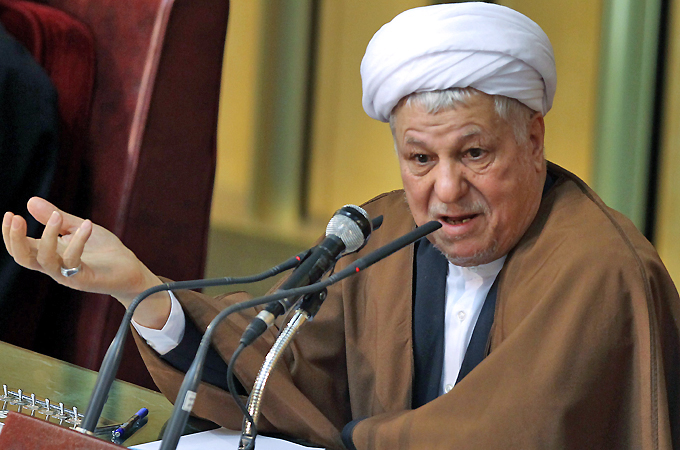Rafsanjani ousted from Iranian post
‘Moderate’ former president steps down as head of state body, a move which seems to tighten hardliners’ grip on power.

 |
| Rafsanjani, who was president from 1989 to 1997, is considered a moderate and pragmatic conservative [AFP] |
Akbar Hashemi Rafsanjani, a former Iranian president and opposition member, has lost his position as head of an important state clerical body after being criticised by hardliners for being too close to the reformist opposition.
Ayatollah Mohammad Reza Mahdavi Kani, 80, was elected as the new chairman of the Assembly of Experts on Tuesday, after Rafsanjani withdrew his candidacy, the semi-official Mehr news agency reported.
Rafsanjani had chaired the 86-member body – which selects the supreme leader, supervises his activities and can dismiss him – since 2007.
“Sixty-three members out of 81 cast vote and voted for Ayatollah Mahdavi Kani who was the only candidate for the chairmanship of the assembly,” Ahmad Khatami, a member of the presiding board of the assembly was quoted as saying by the ISNA news agency.
Rafsanjani declined to make a fresh bid for the post he had held for four years after Mahdavi Kani declared his intention.
“I announce that if Ayatollah Mahdavi Kani is ready to take the responsibility of the Assembly of Experts, I will not run for the post,” Rafsanjani was quoted by the Fars news agency as telling the assembly.
Criticism
Mahdavi Kani was a follower of the founder of the Islamic revolution, Ayatollah Ruhollah Khomeini, years before the triumph of the revolution in 1979.
Before serving as acting prime minister in early 80s, he shortly served as interior minister. He is the current chairman of Imam Sadaq university where many serving Iranian diplomats studied.
The cleric also heads the Association of Militant Clergy, a conservative clerical organisation whose many of its members are holding key regime posts.
Rafsanjani, who was president from 1989 to 1997, is considered a moderate and pragmatic conservative. But he has never hidden his disdain for President Mahmoud Ahmadinejad, who defeated him in the 2005 presidential election.
His fallout with Ahmadinejad began when he indirectly offered support for opposition leader Mir Hossein Mousavi at the 2009 presidential poll.
Ahmadinejad’s victory in the poll, which was hotly disputed by Mousavi and another losing candidate, Mehdi Karroubi, sparked mass demonstrations in the streets, with protesters demanding a new election be held.
In the aftermath of the riots, in which dozens were killed and hundreds arrested, Rafsanjani made headlines by calling for political freedoms and for the release of political prisoners. He repeated the calls on a number of occasions, triggering the wrath of hardliners.
He also came under harsh criticism from conservatives, who demanded that he publicly condemn the two opposition leaders. The calls grew more strident when anti-government demonstrations resumed mid-February.
Iran’s opposition
In a gradual about-turn which some say was due to increasing pressure from hardliners, Rafsanjani, who also heads the Expediency Council, another key institution of the Islamic republic, finally distanced himself from the opposition.
“In the current situation, I consider that the current constitution is sufficient … Some people are dissatisfied. I advise them to come back [to the regime] because we have no present alternative,” he said in an appeal to protesters.
He more recently condemned the opposition protests and, referring to Karroubi and Mousavi, said the “leaders of sedition … best served America and the Zionist regime.”
One of Rafsanjani’s sons, Mohsen Hashemi, resigned on Saturday as chairman of Tehran’s metro, reportedly under pressure from the municipality by the government of Ahmadinejad.
Hashemi was reportedly at odds with Ahmadinejad, resulting in the metro not receiving the government subsidies it was allocated.
Faezeh Hashemi, Rafsanjani’s outspoken daughter, was briefly detained after “leading anti-revolutionaries and rioters” in Tehran protests on February 20.
Rafsanjani’s other son, Mehdi, who is outside Iran, has an arrest warrant issued against him over his supposed role in the post election protests, though it has never been executed.